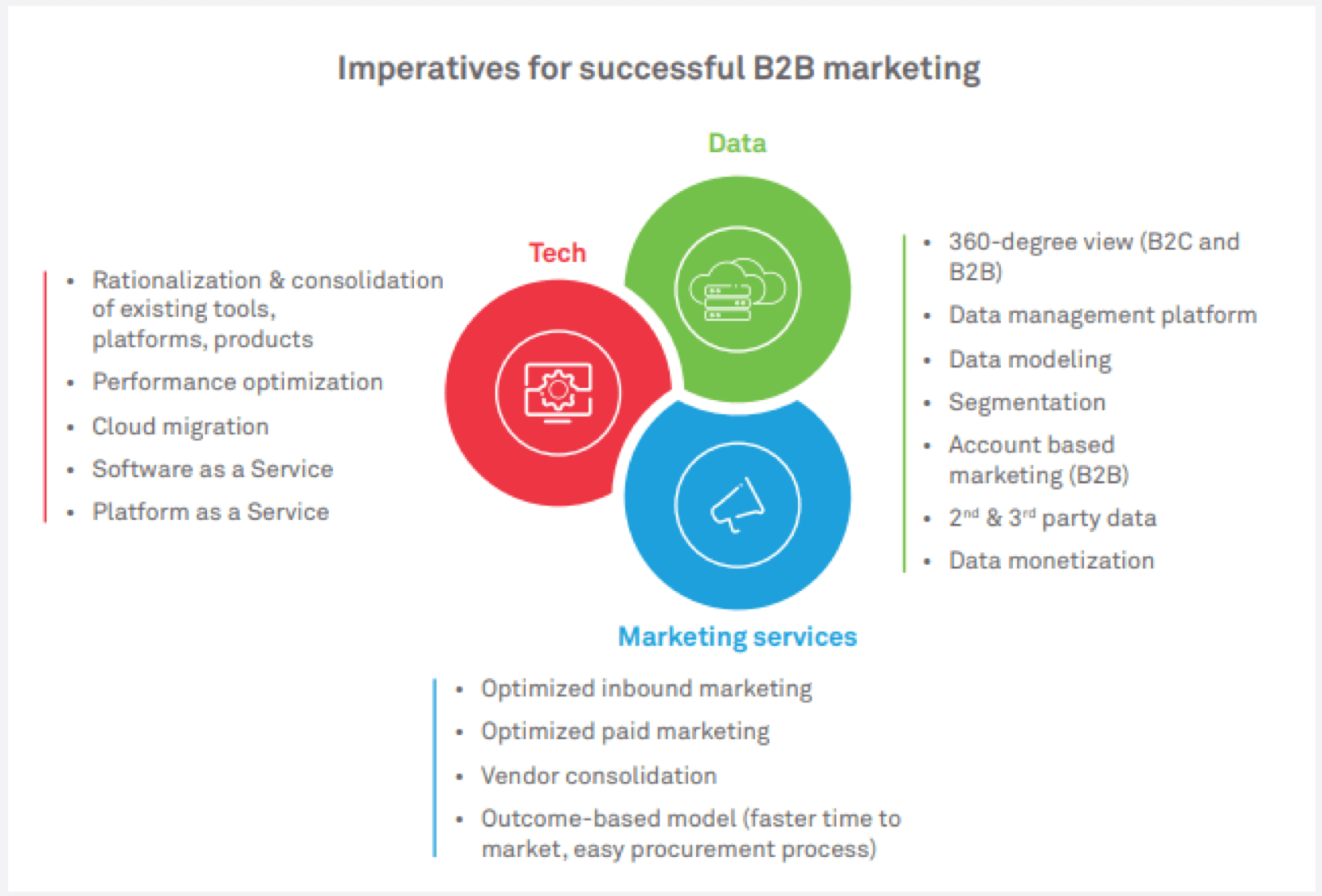Business-to-business (B2B) digital marketers are increasingly taking a page out of the consumer marketing playbook by serving potential customers personalized experiences and targeted content. They’re adopting these tactics because their customers are behaving like consumers when it comes to making purchase decisions. About 74 percent of B2B buyers conduct half of their research online before making an offline purchase according to Forrester,1 while Gartner found that even in the late stages of the purchasing cycle, 83 percent of buyers continued their online research – for instance, validating information they get from sales reps.2
As B2B buyers demand more personalized experiences that are contextualized to their needs, CMOs, CIOs, and CTOs realize they need to embrace strategic initiatives enabled by data, technology, and marketing services and operations while investing in content marketing, big data, artificial intelligence, and machine learning.
Most organizations, however, fall short on realizing their vision to implement these initiatives – and these shortfalls are not due to a lack of will or technology. As of April 2018, 6,829 marketing technology products were on the market to support various sales and marketing needs.3 Over the past few years, businesses have invested in a variety of stand-alone technologies that serve a single or multiple marketing functions. Multiple products serving the same function often exist within the same organization without any integration to deliver an end-to-end omni-channel experience. To overcome these challenges and meet customer expectations, organizations must create nimble and agile marketing services.
Three crucial marketing considerations
To create agile marketing services, business leaders need to focus on these top three strategic marketing considerations: customer centricity, technology enablers, and optimized marketing services and operations.
Consider the following focal points to structure similar design thinking workshops:
1) Customer centricity
Achieving customer centricity starts with acquiring and optimally managing customer data – including data on past purchases, past inquiries, current browsing behaviour, and search terms.
Customer-centric organizations prioritize the following imperatives for data management:
Questions that marketing departments need to answer:
2) Technology enablers
Most marketing organizations buy the technology first, then try to figure out a way to use it. As a result, they often own multiple products performing the same or similar marketing functions. The complexity and cost of integration inevitably leads to a broken tech stack.
Key imperatives for organizations to effectively utilize marketing technology:
Questions that marketing departments need to answer:
3) Optimized marketing services and operations
Organizations often have multiple sets of resources working on the same tasks. For example, an organization’s digital marketing team might include two system integrators, each consisting of two employees, two sub-contractors, and four developers. With so many perspectives, conflicting priorities and lack of ownership arise, resulting in delays to digital projects.
Key imperatives for organizations to achieve optimized marketing services and operations:
Questions that marketing departments need to answer:

Figure 1: Digital marketing imperatives – data, technology, and marketing services
The power of data, technology and marketing
Today’s B2B world demands thought leadership and action in the digital marketing space. Individuals can support the goals of their organizations – faster time to market, optimized marketing spend, and a consolidated technology stack – by initiating design thinking workshops to examine the strategic combination of data, technology, and marketing services. As global competition raises the pressure on organizations to differentiate themselves in new ways, the time to invest in these important considerations is now.
References
1 https://go.forrester.com/b2b/
2 https://www.gartner.com/smarterwithgartner/what-sales-should-know-about-modern-b2b-buyers/
3 https://chiefmartec.com/2018/04/marketing-technology-landscape-supergraphic-2018/
Namit Bhargava
Head of Digital Sales, Digital Transformation
As a digital strategist and consultant, Namit has honed his expertise on all things “connected” – leveraging IoT to enable connected workers, assets, plants, supply chain, and B2C and B2B ecommerce. A true believer in execution with a knack for tackling strategic blind spots, Namit leads organizations in innovation and transformation initiatives.